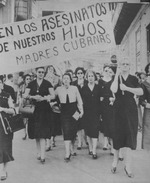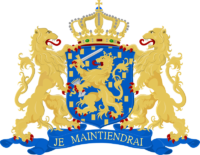John Jansen van Galen ~ Afscheid van de koloniën. Het Nederlandse dekolonisatiebeleid 1942-2010
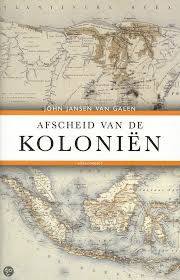 Dekolonisatie is het tegenovergestelde van kolonisatie. Kolonisatie is de vestiging van mensen en/of kapitaal op vreemd, buitenlands grondgebied. Wanneer daar uitoefening van macht over dat gebied en zijn bevolking op volgt, is er sprake van kolonialisme. Dit is volgens Rupert Emerson ‘het vestigen en voor langere tijd handhaven van heerschappij over een vreemd volk dat gescheiden is van en ondergeschikt aan de overheersende macht’. (1) Of, in de omschrijving van Maarten Kuitenbrouwer, ‘het doelgerichte en daadwerkelijke streven naar de vestiging van formele of informele heerschappij over een andere samenleving’. (2) Heerschappij, het uitoefenen van macht, over een ander volk maakt in deze definities het wezen van kolonialisme uit. Paul Kennedy beschrijft het begrip aan de hand van een aantal andere kenmerken, maar de meeste daarvan zijn niet onderscheidend omdat ze ook buiten koloniale situaties voorkomen: het bestaan van een kleurbarrière, economische afhankelijkheid, geringe sociale zorg voor het volk, gebrek aan sociaal contact tussen overheersers en overheersten. (3) Een raciaal verschil tussen de betrokken volkeren, dat ook wel als kenmerk genoemd wordt, is evenmin wezenlijk voor kolonialisme: zo waren Canada, Australië en IJsland wel koloniën van respectievelijk Engeland en Denemarken, maar in hoofdzaak door blanken bevolkt. Alleen politieke ondergeschiktheid van een gebied en zijn bevolking aan een buitenlandse, overzeese mogendheid onderscheidt het kolonialisme van andere politieke systemen.
Dekolonisatie is het tegenovergestelde van kolonisatie. Kolonisatie is de vestiging van mensen en/of kapitaal op vreemd, buitenlands grondgebied. Wanneer daar uitoefening van macht over dat gebied en zijn bevolking op volgt, is er sprake van kolonialisme. Dit is volgens Rupert Emerson ‘het vestigen en voor langere tijd handhaven van heerschappij over een vreemd volk dat gescheiden is van en ondergeschikt aan de overheersende macht’. (1) Of, in de omschrijving van Maarten Kuitenbrouwer, ‘het doelgerichte en daadwerkelijke streven naar de vestiging van formele of informele heerschappij over een andere samenleving’. (2) Heerschappij, het uitoefenen van macht, over een ander volk maakt in deze definities het wezen van kolonialisme uit. Paul Kennedy beschrijft het begrip aan de hand van een aantal andere kenmerken, maar de meeste daarvan zijn niet onderscheidend omdat ze ook buiten koloniale situaties voorkomen: het bestaan van een kleurbarrière, economische afhankelijkheid, geringe sociale zorg voor het volk, gebrek aan sociaal contact tussen overheersers en overheersten. (3) Een raciaal verschil tussen de betrokken volkeren, dat ook wel als kenmerk genoemd wordt, is evenmin wezenlijk voor kolonialisme: zo waren Canada, Australië en IJsland wel koloniën van respectievelijk Engeland en Denemarken, maar in hoofdzaak door blanken bevolkt. Alleen politieke ondergeschiktheid van een gebied en zijn bevolking aan een buitenlandse, overzeese mogendheid onderscheidt het kolonialisme van andere politieke systemen.
Volledige proefschrift(PDF): http://www.atlascontact.nl/jansen-van-galen-proefschrift.pdf
Dutch Involvement In The Transatlantic Slave Trade And Abolition
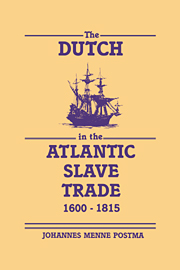 On 1 July 1863, slavery was abolished in the former Dutch colonies of Suriname and the Dutch Antilles. This ended a period of around 200 years of slavery in these colonies. To mark the 150th anniversary of Dutch abolition in 2013, various activities have been organized, including exhibitions in the National Library of the Netherlands, the History Museum of The Hague, and the University of Amsterdam.
On 1 July 1863, slavery was abolished in the former Dutch colonies of Suriname and the Dutch Antilles. This ended a period of around 200 years of slavery in these colonies. To mark the 150th anniversary of Dutch abolition in 2013, various activities have been organized, including exhibitions in the National Library of the Netherlands, the History Museum of The Hague, and the University of Amsterdam.
To coincide with these commemorations and provide background information, the Library, Documentation and Information Department of the African Studies Centre Leiden has compiled the present web dossier on Dutch involvement in the slave trade. It contains titles published in the past ten years, all of which are available in the ASC Library. Each title links directly to the corresponding record in the library’s online catalogue, which provides further bibliographic details and abstracts, loan information, and links to full text if available. The dossier concludes with links to a number of relevant web sites.
Read more: http://www.ascleiden.nl/dutch-involvement
Bonaire.tv ~ Fuhikubo ta presentá
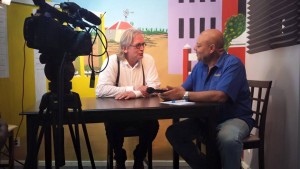 Eerst komen Andreina Vargas en Carlene Barrios aan het woord. Om dat gesprek te kunnen volgen is kennis van het Papiamentu nodig. Je kunt dat deel ook overslaan natuurlijk. Dan schuif je naar 34.32 min. en daar begint een heel ander verhaal. Een interview met Auke van der Berg (Rozenberg Quarterly) over de gang van zaken op Bonaire na 10.10.10.
Eerst komen Andreina Vargas en Carlene Barrios aan het woord. Om dat gesprek te kunnen volgen is kennis van het Papiamentu nodig. Je kunt dat deel ook overslaan natuurlijk. Dan schuif je naar 34.32 min. en daar begint een heel ander verhaal. Een interview met Auke van der Berg (Rozenberg Quarterly) over de gang van zaken op Bonaire na 10.10.10.
Den e prome parti di e programa aki nos ta kombersa ku Sra. Andreina Vargas i su yu muhé Carlene Barrios. Carlene ta sufri di e malesa ku jama ”Down Syndrome”.
Den e di dos parti di e programa nos ta kombersa ku ku Sr. Auke van der Berg ku ta un eskritor. Ela bin Boneiru spesialmente pa akumula informashon pa skirbi un buki tokante kon a bai ku Boneiru despues di e famoso fecha di 10-10-10.
Zie: http://bonaire.tv/?p=3343
The Caribbean Commons ~ Sexualities And Social Justice In The Caribbean

Sexualities in the Tent, Wall Mural at Bohemia, Port of Spain, Trinidad and Tobago, July 2013 Photo credit: Angelique V. Nixon.
Movements for sexual citizenship and equal rights for sexual minorities across the region (particularly in the Anglophone and Hispanophone Caribbean) are growing and have garnered local and international media attention. With recent court cases challenging discriminatory laws and the backlash and frenzy over a so-called “gay lobby” in the region, we are at a crucial juncture of visibility, misrepresentation, anti-sexual minority violence, increased activism, lawsuits, and ongoing survival. It is a vital time to respond to recent events critically and from myriad perspectives, as well as to reflect on these movements, make interventions, fight against misrepresentation and violence, and share strategies for community building and solidarity. What is the landscape of sexual minority activism across the region? Who are the regional activists and what are the most recent developments? How are these issues being represented in the media, popular culture, and cultural productions in the English-, Spanish-, French-, Creole- and Dutch-speaking Caribbean? How do we build community, forge resistance to violence and discrimination, and at the same time, demand equal rights and treatment under the law? Where is our hope and love in building community?
Gert Oostindie & Inge Klinkers ~ Decolonising The Caribbean ~ Dutch Policies In A Comparative Perspective
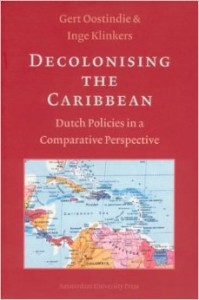 For over two centuries much of the Caribbean has been embroiled in heated,and initially violent, decolonisation. One may well date the beginnings of the process to the first recorded retreats of European colonisers, the conclusion of the eighteenth century peace treaties between the British and the Maroons of Jamaica, and then between the Dutch and the Maroons of Suriname – struggles for freedom which were, however, inconsequential in post-colonial history. So, Caribbean decolonisation formally began with the 1791 Haitian Revolution. With this seminal event came the dawning of a new era. Constitutional sovereignty was subsequently secured by the Dominican Republic (1844) and at the start of the twentieth century by Cuba (1901). Both were late in securing sovereignty by Latin American standards.
For over two centuries much of the Caribbean has been embroiled in heated,and initially violent, decolonisation. One may well date the beginnings of the process to the first recorded retreats of European colonisers, the conclusion of the eighteenth century peace treaties between the British and the Maroons of Jamaica, and then between the Dutch and the Maroons of Suriname – struggles for freedom which were, however, inconsequential in post-colonial history. So, Caribbean decolonisation formally began with the 1791 Haitian Revolution. With this seminal event came the dawning of a new era. Constitutional sovereignty was subsequently secured by the Dominican Republic (1844) and at the start of the twentieth century by Cuba (1901). Both were late in securing sovereignty by Latin American standards.
Whereas the three most populated Caribbean countries had now gained independence, the rest of the region remained firmly locked within colonialism, either dependent on the traditional metropolitan powers, the United Kingdom, France and the Netherlands, or usurped by the ascending power of the United States. At the outbreak of World War ii most Caribbean territories were still bound in colonial tutelage.
A new wave of decolonisation swept the region in the 1960s and 1970s. Today most of the Caribbean is sovereign and some 85 per cent of the 37 million Caribbean people live in independent countries. However, it appears that independence was achieved at a high price. In general terms, standards of living in the non-sovereign Caribbean are significantly higher than they are in the independent countries. Furthermore, in a region that has witnessed many dictatorial regimes and territorial disputes, and which
now faces the contemporary challenges of international crime, the remaining non-sovereign territories still continue to enjoy a higher degree of security and stability. Small wonder then that the urge for independence in these territories is weak, and indeed it seems that Caribbean decolonisation may well have reached its final dénouement with the present status quo.
Download the book (PDF-file): www.oapen.org/
Amsterdam University Press,Amsterdam, 2003
dLOC ~ Digital Library Of The Caribbean
The Digital Library of the Caribbean (dLOC) is a cooperative digital library for resources from and about the Caribbean and circum-Caribbean. dLOC provides access to digitized versions of Caribbean cultural, historical and research materials currently held in archives, libraries, and private collections.
Read the dLOC Fact Sheet (and more about dLOC), see the dLOC partners, read about dLOC’s Protecting Haitian Patrimony Initiative, or Register for a free mydLOC user account. Please contact us with any questions.
dLOC is developing a collaborative funding model. Support dLOC financially by becoming an institutional member or a personal member.
Go to: http://www.dloc.com/
